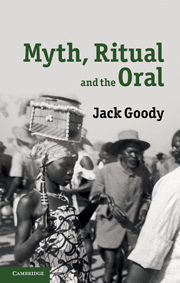Book contents
- Frontmatter
- Contents
- Acknowledgements
- Introduction
- 1 Religion and ritual from Tylor to Parsons: the definitional problem
- 2 Oral ‘literature’
- 3 The anthropologist and the audio recorder
- 4 Oral creativity
- 5 The folktale and cultural history
- 6 Animals, humans and gods in northern Ghana
- 7 The Bagre in all its variety
- 8 From oral to written: an anthropological breakthrough in storytelling
- 9 Writing and oral memory: the importance of the ‘lecto-oral’
- Appendix Folktales in northern Ghana
- References
- Index
6 - Animals, humans and gods in northern Ghana
Published online by Cambridge University Press: 05 June 2012
- Frontmatter
- Contents
- Acknowledgements
- Introduction
- 1 Religion and ritual from Tylor to Parsons: the definitional problem
- 2 Oral ‘literature’
- 3 The anthropologist and the audio recorder
- 4 Oral creativity
- 5 The folktale and cultural history
- 6 Animals, humans and gods in northern Ghana
- 7 The Bagre in all its variety
- 8 From oral to written: an anthropological breakthrough in storytelling
- 9 Writing and oral memory: the importance of the ‘lecto-oral’
- Appendix Folktales in northern Ghana
- References
- Index
Summary
The societies of the decentralized, tribal LoDagaa (‘acephalous’) and the highly organized state of the Gonja live in similar surroundings and have a similar set of folktales as far as the three main categories of humans, gods and animals are concerned. But the proportion is different: more chiefs appear in the folktales of the non-centralized society, fewer in those of the centralized one. This is relevant to both the functional and the structural points of view, and speaks to the significance of cross-cultural communication and the role of ‘fancy’.
In many respects LoDagaa and Gonja societies were very different, though both were situated in the savannah of northern Ghana. One was an acephalous, farming society with no regular political organization; chiefship was absent, though undoubtedly men of influence reached positions of leadership from time to time; there was no literate tradition and contact with Islam was very slight. Gonja on the other hand was a long-established, highly differentiated chiefdom, members of which kept up continuing contacts with northern Nigeria, the Niger bend and even the Mediterranean. The kingdom comprised a number of ethnic communities. Part of the population were Muslims, a few of these were literate and the whole society was influenced by the Islamic world in one respect or another.
- Type
- Chapter
- Information
- Myth, Ritual and the Oral , pp. 84 - 94Publisher: Cambridge University PressPrint publication year: 2010



